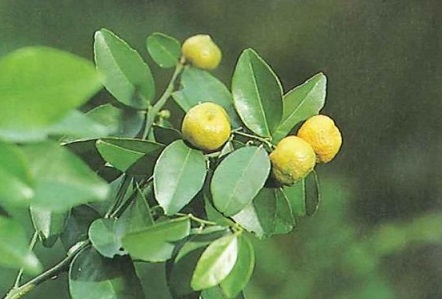COVID-19 Herbs: Taiwanese And Swedish Study Finds That Polymethoxyflavone From Citrus Depressa Is Able To Inhibit Various SARS-CoV-2 Variants.
Nikhil Prasad Fact checked by:Thailand Medical News Team Nov 26, 2023 1 year, 4 months, 3 weeks, 1 day, 18 hours, 38 minutes ago
COVID-19 Herbs: The persistent threat of the global COVID-19 pandemic has fueled an insatiable quest for effective antiviral treatments. In this pursuit, researchers from Taipei Medical University in Taiwan, AlbaNova University Centre in Sweden, and the National Research Institute of Chinese Medicine (NRICM) in Taiwan have collaborated to explore the potential of Citrus depressa Hayata, a traditional Chinese medicinal herb, in inhibiting various SARS-CoV-2 variants. This comprehensive
COVID-19 Herbs study delves into the unique properties of Citrus depressa, shedding light on polymethoxyflavones (PMFs) and their ability to act as potent inhibitors of the SARS-CoV-2 spike protein.
 Citrus depressa Hayata
Background and Rationale
Citrus depressa Hayata
Background and Rationale
Citrus depressa, a key component in traditional Taiwanese medicine used to formulate Chen-Pi, (A Traditional Chinese Medical concoction) has a rich history of treating respiratory ailments. Scientific investigations have not only validated its historical use but have also unearthed a plethora of beneficial properties, including antioxidative, anti-inflammatory, anticancer, neuroprotective, hepatoprotective, and hypolipidemic effects. With the global surge in COVID-19 cases and the constant evolution of SARS-CoV-2 variants, the need for effective antiviral agents has never been more urgent. The study aims to isolate universal inhibitors from Citrus depressa, specifically targeting the SARS-CoV-2 spike protein, and elucidate the mechanisms behind their inhibitory effects.
Materials and Methods
To undertake this ambitious study, the researchers employed a meticulous approach. The whole fruit of Citrus depressa underwent ethanol extraction, followed by partitioning to derive water, butanol, and ethyl acetate fractions. This diverse set of fractions facilitated a multifaceted exploration of Citrus depressa's inhibitory potential. The study integrated cutting-edge techniques such as surface plasmon resonance (SPR) assays, SARS-CoV-2 pseudo-virus assays, molecular docking, and ELISA-based spike protein binding assays. These methodologies aimed to not only identify but also comprehensively characterize the bioactive constituents responsible for hindering the interaction between the SARS-CoV-2 spike protein and hACE2.
Results and Findings
The study's findings are profound, revealing that both the crude extract and the ethyl acetate layer of Citrus depressa exhibited significant inhibitory activity against SARS-CoV-2 Omicron BA.4/5, with IC50 values of 77.4 μg/mL and 100 μg/mL, respectively. Importantly, this study unveiled the therapeutic potential of polymethoxyflavones (PMFs) as spike protein inhibitors, a characteristic not previously attributed to these compounds. Among the isolated compounds, 2′-hydroxy-4,4′,5′,6′-tetramethoxychalcone (Cd3) and 5-hydroxy-3′,4′,6,7,8-pentamethoxyflavone (Cd8) emerged as potent inhibitors, disrupting the spike protein and hACE2 complex formation.
ng>Discussion and Mechanistic Insights
The study delved into the mechanism of action of the identified compounds, particularly focusing on their interaction with specific amino acid residues within the SARS-CoV-2 spike protein and hACE2 complex. Molecular docking analyses shed light on the binding affinity and mechanisms of action of Cd3 and Cd8. Notably, these compounds demonstrated a strong affinity for the spike protein, disrupting its interaction with hACE2. The research highlighted the significance of specific amino acid residues, such as Lys353 and Arg498, in the binding process, and the inhibitory effects of Cd3 and Cd8 were attributed to their interactions with these critical residues.
Furthermore, the study explored the bioactivities of ten compounds isolated from the ethyl acetate layer of Citrus depressa. Cd3 and Cd8 stood out as potent inhibitors, exhibiting notable anti-SARS-CoV-2 activity. Interestingly, the study compared these findings with the traditional Chinese medicine prescription, NRICM101, known for its positive therapeutic outcomes in clinical practice. NRICM101 has shown efficacy against various aspects of SARS-CoV-2, targeting ACE2 for host cell entry and 3-chymotrypsin like protease (3CLpro) for virus replication.
The Role of Natural Products in Antiviral Research
The urgency to develop effective antiviral medications against SARS-CoV-2 has prompted an exploration of traditional Chinese herbal medicines and natural products. Previous studies examined the inhibitory activities of commonly used herbal medicines in China against 3CLpro and papain-like protease (PLpro). Citrus depressa, a historical remedy for a range of ailments, emerged as a potential candidate due to its anti-oxidative and anti-inflammatory activities, making it a promising contender for inhibiting SARS-CoV-2 infection of host cells.
The study's focus on Citrus depressa aligns with the principles of traditional Chinese medicine, where the herb has been used historically to treat heartburn, abdominal pain, diarrhea, vomiting, loss of appetite, cough, and as an expectorant. The rich content of polymethoxyflavonoids in Citrus depressa suggests its potential in downregulating key signaling pathways and mitigating the severity of infections. This study not only validates the traditional use of Citrus depressa but also establishes its potential as a therapeutic agent against SARS-CoV-2.
Conclusion and Implications
In conclusion, this comprehensive study has unraveled the inhibitory effect of polymethoxyflavones from Citrus depressa on the SARS-CoV-2 spike protein. The crude extract and specific compounds, notably Cd3 and Cd8, showcased significant potential in preventing infections of different SARS-CoV-2 variants. The multi-drug properties observed in the crude extract further underscore the potential of Citrus depressa as a preventive agent against spike protein infection of host cells.
As the world continues to grapple with the challenges posed by the COVID-19 pandemic, this research opens avenues for innovative and diverse approaches to antiviral drug development. Natural products, especially those deeply rooted in traditional medicine, offer a promising reservoir for potential therapeutic agents.
The study not only contributes to our understanding of Citrus depressa's therapeutic potential but also emphasizes the importance of exploring nature's bounty in the quest for effective antiviral treatments. This research serves as a beacon of hope, guiding future endeavors in the relentless pursuit of solutions to combat the evolving landscape of viral infections.
The study findings were published in the peer reviewed Journal of Ethnopharmacology.
https://www.sciencedirect.com/science/article/pii/S0378874123012825
For the latest on COVID-19 Herbs, keep on logging to Thailand Medical News.
